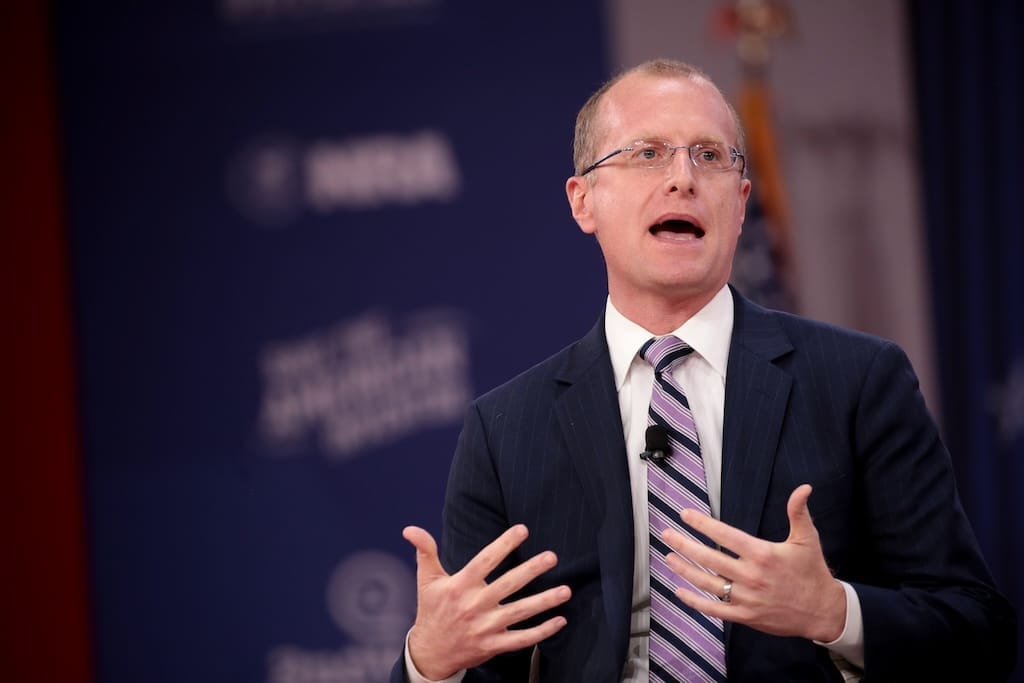FCC’s Carr: Loper Bright ‘Directionally a Really Good Thing’
Former Democratic chairs said the ruling would hobble the agency's rulemaking ability.
Jake Neenan

WASHINGTON, July 17, 2024 – The Federal Communications Commission’s senior Republican said on Wednesday he supported the Supreme Court’s latest move to reign in the authority of federal agencies.
The Supreme Court’s June decision in Loper Bright Enterprises v. Raimondo overruled the Chevron Doctrine, reversing a four-decade-old precedent that required federal courts to defer to federal agencies’ interpretations of ambiguous laws, so long as they were reasonable.
Like the major questions doctrine articulated by the court in 2022, the Loper Bright ruling was seen as strongly curtailing the power of agencies like the FCC.
“In general, my view is that the Supreme Court’s overruling of Chevron is directionally a really good thing,” FCC commissioner Brendan Carr said. “It puts individuals or businesses on a much more level playing field with an administrative agency.”
He said the ruling would ensure the power to interpret laws “remains where I think the framers of the Constitution put it, which is in Congress.”
It’s not surprising that Carr, an outspoken critic of rulemakings undertaken by the agency’s Democratic majority, would support a more restrained FCC. The Loper Bright ruling has already impacted the legal challenge against one of those rulemakings, the commission’s effort to reinstitute net neutrality.
After asking parties for briefs on the decision’s relevance to the case, the Sixth Circuit Court of Appeals pushed back the net neutrality order’s start date to August 5, saying it needed time to consider the motion from ISPs to block the rules entirely while the case plays out.
Carr spoke at a Multicultural Media, Telecom and Internet Council webcast. Former Democratic FCC chairs speaking after Carr worried that the overruling of Chevron could upend administrative law by requiring agencies to act on specific and technical rules from a gridlocked Congress.
Michael Copps, a Democrat who served as a commissioner on the FCC from 2001 to 2011 and briefly as acting chairman in 2009, called the ruling “a catastrophic reversal of the needs of modern government.”
“Congress is incapable of writing legislation for every technicality and every contingency that comes before an agency,” he said. “We don’t have an expert Congress, so we need those expert agencies.”
Reed Hundt, a Democrat who was chairman of the agency from 1993 to 1997, said Loper Bright would likely be an obstacle to important agency actions, regardless of the party in power. He noted Carr would be a potential candidate for chairman under a second Trump administration.
“If Loper Bright were the law in the 18 months in which we administered the ‘96 Telecom Act, then almost all of the rules we passed would have been overturned,” he said. “Congress purposely delegated to the agency the resolution of a lot of tricky issues that were highly technical and highly economic in nature.”
The head of the agency during the Trump administration, Republican Ajit Pai, who rolled back net neutrality rules in 2017, said he was supportive of taking power away from “unelected bureaucrats like us” at the FCC and other agencies.
“I think Loper Bright – while it may cause some short-term disruption – in the long run is far more faithful to the separation of power and to the principles of democratic accountability than what we had before,” he said.










Member discussion